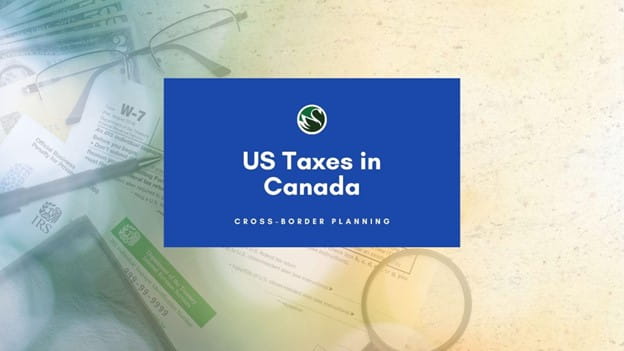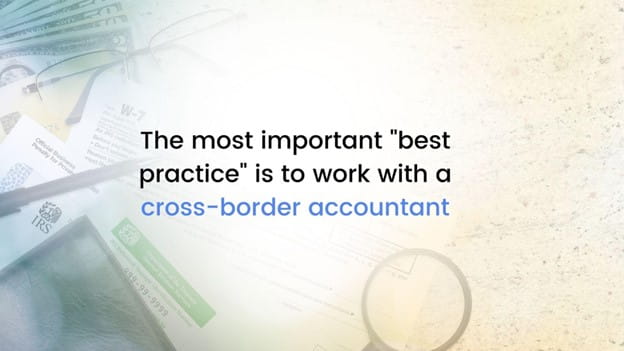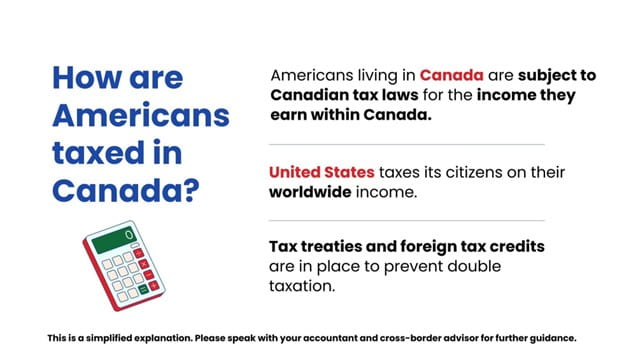U.S. Taxes in Canada: A Simple Guide for Expats and Dual Citizens
Written by Tiffany Woodfield, TEP, Associate Portfolio Manager, CRPC®, CIM® and John Woodfield Portfolio Manager, CFP®, CIM®

What Americans Living in Canada Should Know about Taxes
First, as an American living in Canada, it's important that you seek the guidance of a cross-border accountant and a cross-border advisor. This post will provide you with some general information on U.S. taxes in Canada, but it’s no substitute for working with a professional. When you have financial ties on both sides of the border, taxes and investment management become more complex, particularly if you have a high net worth.
It's important to have a plan in place that prevents sudden large tax hits and other unexpected complications.
If you'd just like a brief overview, these are some of the main tax considerations for Americans in Canada:
- Tax Residency - Americans living in Canada for more than 183 days a year may be considered tax residents of Canada, subjecting their global income to Canadian taxes.
- Filing Requirements - Americans must file tax returns in both Canada and the U.S. because the IRS taxes U.S. citizens on worldwide income.
- Foreign Earned Income Exclusion (FEIE) – Allows qualifying Americans to exclude a certain amount of foreign-earned income from U.S. taxes, adjusting annually for inflation.
- Foreign Tax Credit (FTC) – Americans can credit income taxes paid in Canada against their U.S. tax liability to prevent double taxation.
- Canada-US Tax Treaty - Provides specific rules to reduce double taxation and defines tax residency for those with ties to both countries.
- Tax Rates - Canada generally has higher personal income tax rates compared to the U.S., though the overall tax burden depends on various factors, including income, deductions, and credits. This may mean that you do not have to pay any additional tax in the U.S.
- Tax Deductions and Credits - Certain expenses, like contributions to qualifying pension plans and charitable donations to recognized charities, may be eligible for tax relief in both countries.
- Reporting Foreign Bank and Financial Accounts - Americans must report foreign bank and financial accounts to the U.S. Treasury (FBAR) if the total value exceeds $10,000 at any point in the year.
- Real Estate and Capital Gains - Owning property in Canada can have tax implications in both the U.S. and Canada, especially regarding capital gains taxes.
When Do You Have To Pay U.S. Taxes if You Live in Canada?
According to the IRS, "...if you are a U.S. citizen or a resident alien living outside the United States, your worldwide income is subject to U.S. income tax, regardless of where you live. However, you may qualify for certain foreign earned income exclusions and/or foreign income tax credits."
This requirement applies regardless of where you live or where your income is earned. The U.S. taxes citizens on their global income, so if you have income in Canada, you are obliged to report it to the IRS. You typically need to file by April 15, though living abroad grants an automatic extension until June 15, with the possibility to request further extensions.
IRS: Frequently asked questions (FAQs) about international individual tax matters
Filing Income Tax as an American in Canada
As an American living in Canada, you must file an income tax return with tax authorities in both countries. It's important to report income, expenses, and other pertinent tax information. The U.S. requires the filing of Form 1040, while Canada has its own set of forms. The information reported helps determine the amount of tax owed to each government or the refund due to the taxpayer.
How To File U.S. Taxes from Canada
Filing U.S. taxes from Canada involves several steps. Make sure you speak to a cross-border accountant to ensure that you’re filing correctly.
- Firstly, gather all relevant income documents, including Canadian T4 slips and any other income statements.
- Use the Foreign Earned Income Exclusion (FEIE) or Foreign Tax Credit (FTC) to mitigate double taxation.
- You can file electronically through the IRS website or tax software that supports expat filings. Ensure that you accurately report worldwide income in USD.
- Consider consulting with a cross-border tax professional to navigate complex tax situations.

What Tax Forms Do Americans Living in Canada Have To File?
Americans living in Canada must file Form 1040, the standard U.S. tax return. You'll also need Form 2555 to claim the Foreign Earned Income Exclusion. Form 1116 is required to claim the Foreign Tax Credit. Reporting foreign bank accounts necessitates the FBAR (FinCEN Form 114) through the Financial Crimes Enforcement Network if your foreign accounts exceed $10,000 at any point in the year. Form 8938 might be needed for Specified Foreign Financial Assets if they exceed certain thresholds.
About Form 1040, U.S. Individual Income Tax Return
About Form 2555, Foreign Earned Income
Common Tax Mistakes To Avoid as a U.S. Expat in Canada
Common mistakes include not filing U.S. tax returns while living in Canada, underreporting income by not converting CAD to USD at the correct exchange rate, and misunderstanding the Foreign Earned Income Exclusion or Foreign Tax Credit rules.
Another error is failing to report foreign bank and investment accounts through the FBAR and Form 8938, which can lead to severe penalties.
About Form 8938, Statement of Specified Foreign Financial Assets
Best Practices for U.S. Tax Preparation in Canada
The most important "best practice" is to work with a cross-border accountant, as taxes can get complicated when you have wealth on both sides of the border.
However, if you're doing this on your own, you'll need to stay informed on the latest tax laws and treaty rules. Keep meticulous records of all income, taxes paid, and relevant financial transactions.
Utilize available exclusions and credits to avoid double taxation. Consider using specialized tax software or services that cater to expats.
But again, consulting with a cross-border tax professional to ensure compliance and optimize your tax situation is the best thing you can do.

US-Canada Tax Treaty
The US-Canada Tax Treaty helps prevent double taxation and tax evasion, and it outlines the tax rules for individuals who have income or investments in both the U.S. and Canada. It defines residency for tax purposes, allocates taxing rights on different types of income, and provides reduced tax rates or exemptions on certain types of income. Understanding the treaty is crucial for U.S. citizens in Canada (and vice versa) to navigate their tax obligations effectively.
Latest Tax Updates and Guidelines for U.S. Citizens in Canada
The IRS frequently updates policies affecting expatriates, including regulations around virtual currencies and foreign asset reporting. Always consult the IRS website or a professional advisor for the most current information.
Reporting Canadian Financial Accounts and Assets as a U.S. Citizen
U.S. citizens must report their Canadian financial accounts and assets if they meet the reporting thresholds. This includes bank accounts, investment accounts, and certain pension plans through the FBAR (FinCEN Form 114) if the total value exceeds $10,000 at any time during the year. Additionally, Form 8938 requires reporting of specified foreign financial assets if they exceed the threshold applicable to your filing status.
About Form 8938, Statement of Specified Foreign Financial Assets
Putting Together Your Cross-Border Team
Creating a cross-border team involves selecting professionals with expertise in U.S. and Canadian tax laws, such as accountants, tax lawyers, and financial advisors specialized in cross-border issues.
This team should understand the complexities of both tax systems, be up to date on current laws and treaties, and have a proven track record of assisting U.S. expats in Canada.
Collaboration among your advisors ensures a cohesive financial and tax strategy. We recommend that you find a cross-border wealth management team that can help you create a financial plan and manage your investments for you.

Reporting the Fair Market Value of Canadian Assets
The fair market value is the price that the property would sell for on the open market. In the context of U.S. taxes, the fair market value of Canadian assets is relevant for various tax reporting requirements, including the determination of capital gains or losses when such assets are sold or transferred. For U.S. citizens in Canada, accurately reporting the fair market value of assets in U.S. dollars on their tax returns is crucial to complying with U.S. tax laws.
Top FAQs on U.S. Taxes for Americans in Canada, Dual Citizens, and Canadian Residents
As a cross-border financial advisor with a focus on Americans living in Canada, I can give you a brief overview of some of the most common questions my clients have. But please remember, this information is for general guidance and it's important to consult with a cross-border tax professional for advice tailored to your specific circumstances. In addition, it's critical you speak with a cross-border advisor as you prepare to move across the border.
How can I avoid double taxation?
The amount of Canadian taxes paid can often be credited against your U.S. tax liability to avoid double taxation, thanks to the Foreign Tax Credit (FTC). Properly documenting Canadian taxes paid is essential for claiming these credits on a U.S. tax return.
How are Americans taxed in Canada?
Americans living in Canada are subject to Canadian tax laws for the income they earn within Canada. The United States taxes its citizens on their global income, meaning American citizens in Canada must file tax returns in both countries. However, tax treaties and foreign tax credits are in place to prevent double taxation, allowing taxpayers to credit taxes paid in Canada against their U.S. tax obligations.
As an American in Canada, do I have to pay taxes in Canada and the U.S.?
No, you do not have to pay double tax on the same income if you have ties in Canada and the U.S. The Canada-US Tax Treaty provides mechanisms to avoid double taxation. This includes the Foreign Earned Income Exclusion (FEIE) and Foreign Tax Credit (FTC) in the U.S., which allow you to offset taxes paid in Canada against U.S. taxes, thus preventing double taxation of the same income.
How much U.S. income is tax-free in Canada?
The amount of U.S. income that is tax-free in Canada depends on the application of the Foreign Earned Income Exclusion (FEIE) under U.S. tax law. For the 2023 tax year, the FEIE allows eligible U.S. citizens and resident aliens to exclude up to approximately $112,000 of foreign-earned income from U.S. taxable income. This does not mean that income is tax-free in Canada, but it can be tax-free for U.S. purposes.
Are taxes higher in Canada vs. the U.S.?
Generally, Canadians face higher income tax rates compared to Americans, especially for middle to high-income earners. Canada's progressive tax system and additional social welfare benefits contribute to these higher rates. However, the overall tax burden varies greatly depending on one's income, deductions, and credits in each country, making direct comparisons complex.
Are taxes going up in Canada?
Tax rates and policies can change based on government budgets and fiscal policies. There were very minimal changes to tax rates in 2024. However, the changes would not make a significant difference to most taxpayers.
Are U.S. donations tax deductible in Canada?
U.S. donations can be tax-deductible in Canada if made to registered charities recognized by the Canada Revenue Agency (CRA) and if you have U.S.-source income. The Canada-US Tax Treaty allows for the deduction of charitable contributions against U.S. income, which can then be claimed as a foreign tax credit on your Canadian return if applicable. Work with your cross-border accountant to see if this strategy makes sense for you.
Who qualifies as a tax resident in Canada?
A tax resident in Canada is generally someone who lives in Canada for more than 183 days in a tax year or has significant residential ties to Canada, such as a home, a spouse, or dependents in Canada. The CRA considers your whole situation and ties to the country when determining tax residency. It is important that you speak with your account or review the Income Tax Folio carefully to determine your residence status.
More Info: Income Tax Folio S5-F1-C1, Determining an Individual’s Residence Status
What types of taxation does Canada have?
Canada employs several types of taxation, including income tax, sales taxes (GST/HST and PST), and corporate taxes. Income tax is progressive, with rates increasing as income rises. Sales taxes vary by province, with some applying combined Goods and Services Tax (GST) and Provincial Sales Tax (PST) or a Harmonized Sales Tax (HST). Corporate taxes are levied on business profits. It's important to note that Canadian income tax is often higher than income tax in the U.S. Thus, if you're moving to Canada from the U.S., it's important to do tax planning as part of your moving prep.
How will working as a U.S. citizen in Canada affect your taxes?
Working in Canada as a U.S. citizen subjects you to Canadian tax laws for income earned in Canada while still obligating you to file U.S. tax returns due to the U.S. taxing global income. Utilizing the Foreign Earned Income Exclusion and Foreign Tax Credit can mitigate double taxation. It's crucial to navigate both tax systems efficiently, often requiring consultation with a cross-border tax expert.
What is the Internal Revenue Code?
According to the IRS, "Congress typically enacts Federal tax law in the Internal Revenue Code of 1986 (IRC)." You can review an electronic version of the current United States Code HERE.
How can I determine if I am a resident of Canada for tax purposes?
To determine if you are a resident of Canada for tax purposes, consider both the amount of time you spend in Canada and the nature of your ties to the country. Spending 183 days or more in Canada within a tax year is a strong indicator of residency. However, the Canada Revenue Agency (CRA) also looks at significant residential ties such as owning a home in Canada, having a spouse or common-law partner and dependents in Canada, and maintaining personal property like a car or furniture.
Secondary ties, including social connections, health care plans, and bank accounts, may also be considered. Residency status is thus determined by a combination of physical presence and the extent of your social and economic ties to Canada, reflecting a comprehensive assessment rather than a single criterion.
If you're unsure, please speak with a cross-border accountant.
CRA: Determining your residency status
When To Pay Tax in Canada and the U.S.
As a citizen or resident of a country, you typically have to remit a portion of your income to the government. For Americans in Canada, this means potentially owing taxes in both countries. However, mechanisms like the Foreign Earned Income Exclusion (FEIE), Foreign Tax Credit (FTC), and provisions within the US-Canada Tax Treaty work to mitigate the burden of double taxation, ensuring that individuals pay the correct amount of tax to each jurisdiction.
If you live in Canada but you're an American citizen, you'll most likely need to file tax returns in both countries. In doing so, your tax obligation will become clear. Until you file your tax return, you won't know how much you owe in tax. Before you begin the process of filing taxes in Canada, make sure you're clear on whether you're a Canadian Resident for tax purposes.
NEXT STEPS
If you’re a Canadian resident or are planning on moving to Canada or the U.S. and need assistance with moving and optimizing your investments, estate planning, wealth management, and portfolio management, please get in touch. At SWAN Wealth, we specialize in Canadian financial planning, cross-border financial planning, and cross-border wealth management.
READ MORE
If you’re planning a cross-border move, these articles and guides will help you simplify your move and ensure you’ve covered everything.
Cross-Border Estate Planning Guide
Canada Tax Treaty with the US: Guide for Expats
Living in Canada as an American
ABOUT THE AUTHORS
Tiffany Woodfield is an Associate Portfolio Manager licensed in Canada and the USA, a Chartered Investment Manager (CIM), a Chartered Retirement Planning Counselor (CRPC), a Trust and Estate Practitioner (TEP), and the co-founder of SWAN Wealth Management, along with her husband, John Woodfield. Tiffany advises clients who live in Canada and the United States and want to simplify their cross-border financial plan, move their assets across the border, and optimize their investments to minimize their tax burden. Together, Tiffany and John Woodfield help their clients simplify their cross-border finances and create long-term revenue streams that will keep their assets safe whether they live in Canada or the U.S.
John Woodfield is a Financial Management Advisor (FMA), a Chartered Investment Manager (CIM), and a Certified Financial Planner (CFP), and in 2007 was inducted as a fellow of the Canadian Securities Institute (FCSI). As a portfolio manager and CFP®, he works with clients across Canada. John Woodfield’s clients are families, individuals, and business owners who understand the importance of comprehensive wealth and investment plans driven by the lifestyle they want to lead.
SCHEDULE A CALL
Schedule a 15-minute introductory call with SWAN Wealth Management. Click here to schedule a call.





